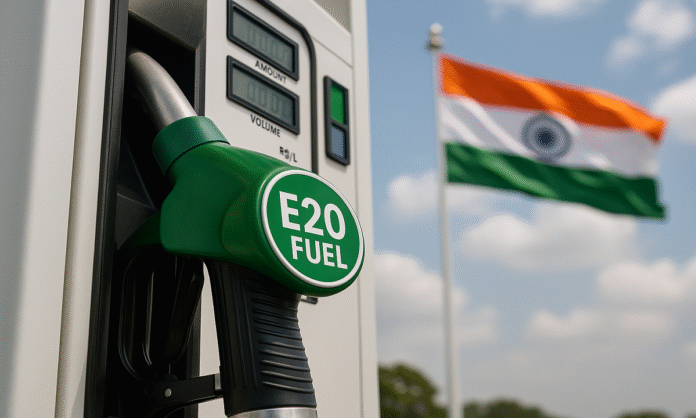Paromita Das
New Delhi, 13th September: This month, the Supreme Court dismissed a petition that argued Bharatiya consumers should have the right to choose between regular petrol and 20 percent ethanol-blended petrol (E20). On the surface, the government’s case looked strong. It promised benefits for sugarcane farmers, a reduction in Bharat’s oil imports, and a move toward a greener future. Yet for millions of motorists, this judgment sparked worry rather than celebration. For anyone driving a vehicle manufactured before April 2023, E20 is not just an inconvenience; it can damage engines, reduce mileage, and inflate maintenance bills.
Imagine a middle-class family still paying off a scooter bought in 2020. Overnight, they are asked to fill their tank with a fuel that could corrode the engine and shorten its life. What the government hails as progress begins to look, for them, like an unfair financial burden. This isn’t an upgrade. It’s an obligation.
Policy First, Consumers Later

The bigger issue is that Bharat seems to have developed a pattern of introducing policies that sound progressive on paper but leave ordinary citizens out of the conversation. The E20 rollout is only the latest example.
Consider the push for electric vehicles. Subsidies and regulations nudge buyers toward EVs, but charging infrastructure remains patchy and unreliable. Renewable energy tells a similar story, where consumers are asked to shoulder higher electricity bills in the name of the “greater good.” In each case, reforms that appear farmer-friendly or climate-conscious on the surface often shift costs onto households that had little say in the matter.
The E20 transition follows this same script: a blanket policy rolled out without parallel supply of E10, without clear labeling at fuel stations, and without any large-scale public education campaign. The message is unmistakable—the state decides, and the motorist complies.
How Other Nations Get It Right

A glance at global examples highlights how Bharat might have taken a more balanced path. In the United States, E10 fuel is the standard, but motorists who want higher ethanol blends such as E15 are free to choose them. Fuel pumps are clearly marked, allowing consumers to decide what works best for their vehicles. Brazil, often showcased as a leader in ethanol adoption, provides both pure petrol and ethanol blends at its stations. Once again, the decision rests with the consumer.
Bharat skipped this step entirely. By forcing E20 without offering alternatives, it not only ignored consumer choice but also risked eroding trust in environmental reforms. Instead of building a coalition of willing participants, the rollout created a population of reluctant users.
Farmers Gain, Consumers Pay

Supporters of the policy argue that it benefits sugarcane farmers while reducing dependency on imported oil. Those outcomes are undeniably important, yet the question remains—should the costs of this reform be transferred to unsuspecting motorists?
If the real goal is to support farmers, the government has more equitable tools at its disposal. Direct income support, subsidies to improve agricultural productivity, or targeted blending mandates for government fleets could all help without pushing the burden onto consumers who bought vehicles in good faith. Instead, the present system effectively taxes ordinary citizens in the name of progress.
The Danger of Resentment

The long-term risk is not just mechanical damage to vehicles but also psychological damage to public trust. When people feel cornered into reforms that increase their expenses and reduce their freedom, they grow skeptical of future environmental policies.
This is a dangerous trajectory. For Bharat to succeed in its green transition—whether through ethanol, electric vehicles, or renewable energy—citizens must see these moves as improvements to their lives, not forced sacrifices. Progress built on resentment rarely lasts.
A Smarter Road Ahead

Bharat still has an opportunity to course-correct. Instead of treating motorists as passive subjects, the government could make them active partners in the transition. That means offering both E10 and E20 fuels at stations, giving automakers a reasonable transition window, and launching campaigns to educate consumers about which fuels suit their vehicles.
Such steps would not slow Bharat’s march toward energy security or environmental sustainability. On the contrary, they would strengthen it by ensuring that reforms rest on trust and participation rather than compulsion.
Choice Is the Real Catalyst

The Supreme Court’s decision may have closed one legal door, but it has opened a wider debate about the role of choice in Bharat’s policy-making. The E20 story is not just about ethanol. It is about how reforms are introduced and whether citizens are treated as partners or as obstacles to be managed.
Real progress demands more than ambitious targets. It requires public confidence. By respecting consumer choice, Bharat could transform E20 from a contested mandate into a milestone welcomed by motorists and farmers alike.
Reform Should Empower, Not Burden
E20 might be a logical step in Bharat’s energy journey, but the way it has been implemented risks leaving consumers frustrated and financially exposed. Supporting farmers and reducing oil imports are goals worth pursuing, but not at the cost of trust and fairness.
The lesson from global examples is clear: choice is not the enemy of reform; it is its foundation. If Bharat wants lasting success, it must build policies that empower citizens, not policies that treat them as passive subjects. Only then will milestones like E20 truly drive the country toward a greener and more equitable future.
The post Supreme Court on E20 Petrol: Why Consumer Choice Still Matters appeared first on Global Governance News- Asia's First Bilingual News portal for Global News and Updates.



